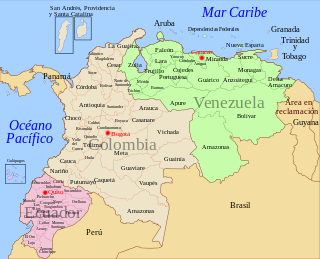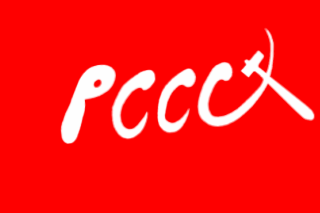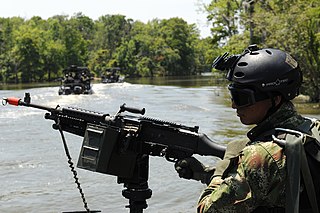 W
WThe Common Alternative Revolutionary Force is a communist political party in Colombia, established in 2017 as the political successor of the former rebel group the Revolutionary Armed Forces of Colombia (FARC). The peace accords agreed upon by the Revolutionary Armed Forces of Colombia and the Colombian government in 2016 provided for the FARC's participation in politics as a legal, registered political party following its successful disarmament.
 W
WThe Revolutionary Armed Forces of Colombia—People's Army was a guerrilla group involved in the continuing Colombian conflict starting in 1964. They were known to employ a variety of military tactics in addition to more unconventional methods, including terrorism. The FARC–EP was formed during the Cold War period as a Marxist–Leninist peasant force promoting a political line of agrarianism and anti-imperialism.
 W
WThe 2008 Andean diplomatic crisis was a diplomatic stand-off between the South American countries of Ecuador, Colombia and Venezuela. It began with an incursion into Ecuadorian territory across the Putumayo River by the Colombian military on March 1, 2008, leading to the deaths of over twenty militants, including Raúl Reyes and sixteen other members of the Revolutionary Armed Forces of Colombia (FARC). This incursion led to increased tension between Colombia and Ecuador and the movement of Venezuelan and Ecuadorian troops to their borders with Colombia.
 W
WThe Catatumbo campaign has been an ongoing period of strategic violence between militia faction groups in the Catatumbo region of Colombia and Venezuela since January 2018. It is an extension of the War on drugs and developed after the Colombian peace process of 2016. The existence of the war was officially announced in August 2019 after a Human Rights Watch (HRW) investigation. Colombian media reports that the war has directly affected an estimated 145,000 people, with the HRW estimating this at 300,000.
 W
WThe Clandestine Colombian Communist Party was an underground communist party in Colombia. It was politically linked to the Revolutionary Armed Forces of Colombia (FARC), which founded the party in 2000. After FARC officially broke with the Colombian Communist Party (CCP), a separate FARC-based party structure came into de facto existence during most of the 1990s, until the PCCC was officially founded in 2000. The party's founder and leader was FARC's commander Guillermo León Sáenz, also known as "Alfonso Cano", who was killed in action in 2011.
 W
WThe Colombia Three are three individuals – Niall Connolly, James Monaghan and Martin McCauley – who are currently living in the Republic of Ireland, having fled from Colombia, where they were sentenced to prison terms of seventeen years for training FARC rebels. The incident came during a crucial time in the Northern Ireland peace process and risked damaging it. The three were granted amnesty by a Colombian special court in April 2020.
 W
WThe Colombian Communist Party or PCC is a legal communist party in Colombia. It was founded in 1930 as the Communist Party of Colombia, at which point it was the Colombian section of the Comintern, and changed its name in 1991. The party is currently led by Jaime Caycedo and publishes a weekly newspaper called Voz.
 W
WThe Colombian conflict began on May 27, 1964 and is a low-intensity asymmetric war between the government of Colombia, far-right paramilitary groups, crime syndicates and far-left guerrilla groups such as the Revolutionary Armed Forces of Colombia (FARC), the National Liberation Army (ELN) and the Popular Liberation Army (EPL), fighting each other to increase their influence in Colombian territory. Some of the most important international contributors to the Colombian conflict include multinational corporations, the United States, Cuba and the drug trafficking industry.
 W
WThe El Caguán DMZ was a demilitarized zone of 42,000 km² in southern Colombia authorized by the government of President Andrés Pastrana to negotiate a peace process with the Revolutionary Armed Forces of Colombia (FARC-EP). It existed for three years, from 1999 until 2002.
 W
WThe 2003 El Nogal Club bombing was a terrorist attack that occurred in Bogotá, Colombia. On February 7, 2003, a car containing 200 kg of explosives that was parked in a garage on the third floor of the multi-story El Nogal club, an elite, high-class social and business club, exploded, killing 36 people and wounding more than 200. There were approximately 600 people in the building at the time of the explosion. The attack was the worst in Colombia for more than a decade.
 W
WOperation Jaque, named after the first letter of the month of the operation, July, and referencing check in chess, was a Colombian military operation that resulted in the successful rescue of 15 hostages, including former Colombian presidential candidate Íngrid Betancourt. The hostages had been held by the Revolutionary Armed Forces of Colombia (FARC). The operation took place on July 2, 2008, along the Apaporis River in the department of Guaviare.
 W
WFARC dissidents refers to a group, formerly part of the Revolutionary Armed Forces of Colombia, who have refused to lay down their arms after the FARC-government peace treaty came into effect in 2016 or resumed their insurgency afterwards. As of 2018, the dissidents number some 2,000 to 2,500 armed combatants with an unknown number of civilian militia supporting them. The FARC dissidents have become "an increasing headache" for the Colombian armed forces, as they have to fight them, the EPL, ELN and Clan del Golfo at the same time.
 W
W"Marquetalia Republic" was an unofficial term used to refer to one of the enclaves in rural Colombia which communist peasant guerrillas held during the aftermath of "La Violencia". Congressmen of the Colombian Conservative Party described these enclaves, including Marquetalia, as "independent republics" which needed to be brought under state control through military force. This area was eventually overrun by the National Army of Colombia in May 1964.
 W
WOperación Fénix, was an attack by the Colombian military against a camp of the guerrilla group the Revolutionary Armed Forces of Colombia (FARC) 1.8 kilometers (1.1 mi) over the border in Sucumbíos Province, Ecuador on March 1, 2008. The raid succeeded in killing Raúl Reyes, second-in-command of FARC, as well as some two dozen individuals present in the encampment, including an Ecuadorian citizen and four Mexicans, allegedly research students invited to the camp after attending a Bolivarian congress in Quito. In the aftermath of the attack, a diplomatic crisis emerged between Ecuador, Colombia, and Venezuela.
 W
WOperation Traíra was the response of the Brazilian Armed Forces, with support from the Colombian Army, to an attack on their detachment on the bank of the Traíra River by FARC in February 1991.
 W
WThe Patriotic Union or UP is a leftist Colombian political party. It was founded by the FARC and the Colombian Communist Party in 1985, as part of the peace negotiations that the guerrillas held with the Conservative Belisario Betancur administration. The party was subject to political violence from drug lords, paramilitaries and security forces agents during the mid-1980s, leading to its eventual decline, virtual disappearance and extermination.
 W
WThe Valle del Cauca Deputies hostage crisis refers to the kidnapping of 12 Deputies of the Valle del Cauca Department, Colombia, on April 12, 2002 by members of the Revolutionary Armed Forces of Colombia (FARC) to pressure a prisoner exchange between them and the government and to negotiate the demilitarization of the municipalities of Florida and Pradera to initiate peace dialogues.